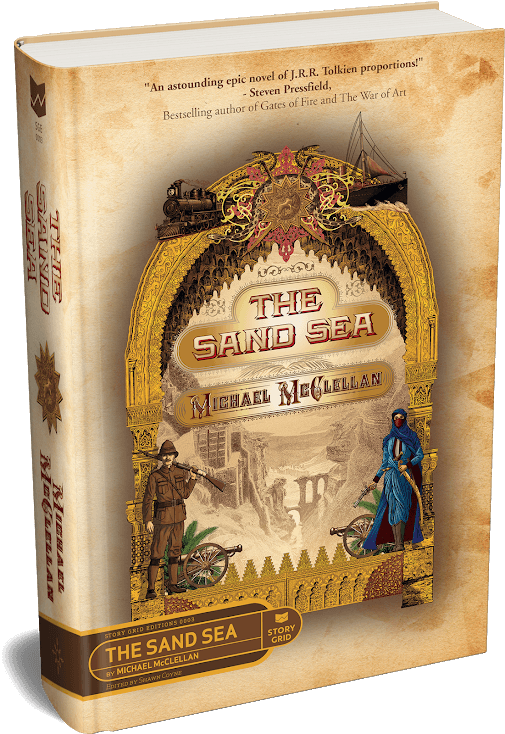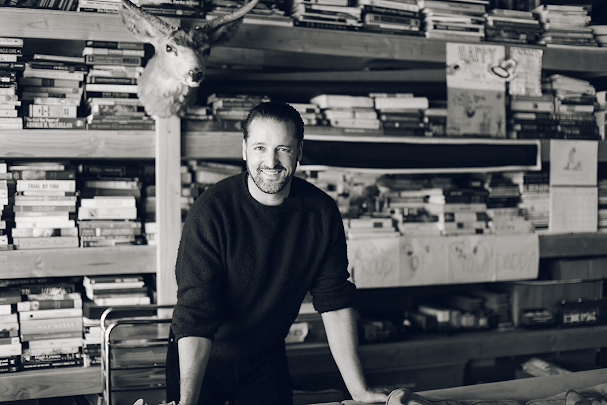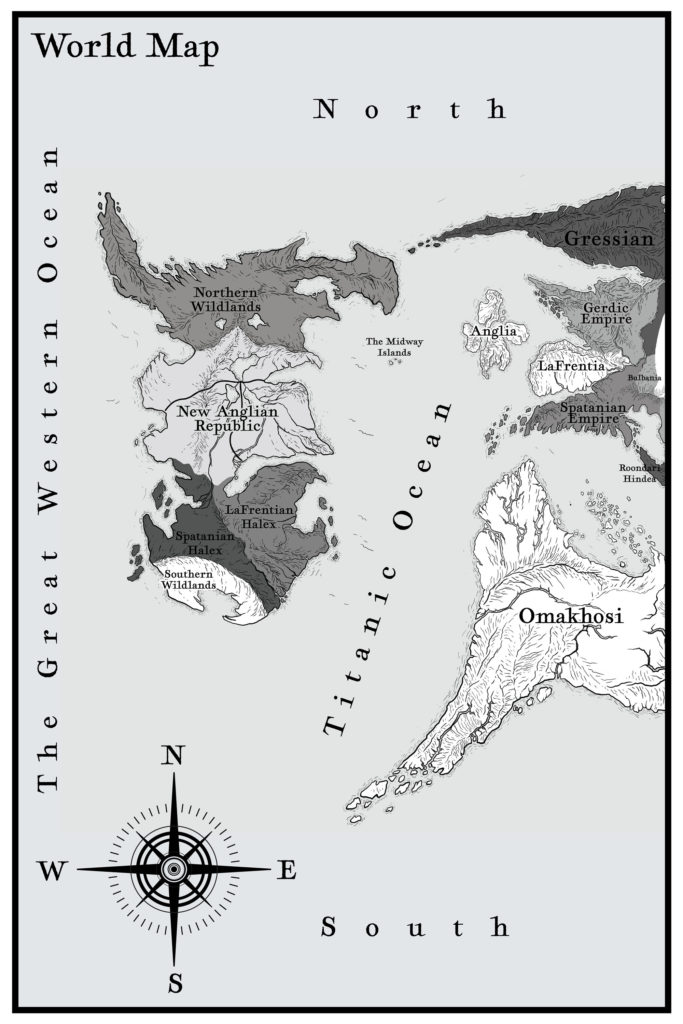Originally published in the Wingsong News Summer Edition June 2020 by
Patricia Mather Parker.

The Sand Sea is your first novel. What inspired you to tell this epic story?
I've always loved big, epic books that transported me to a far-away place and kept me there for a long time. Tolkien's The Lord of the Rings and Martin's A Song of Ice and Fire are some of my favorites. I remember reading them and even though it was late in the evening and I knew I had somewhere to be early in the morning, I kept reading anyway. My dream was always to write a book that had the potential to do that.
The twist for me was that I have always also been drawn to the history of the late 19th Century -- the peak of the British Empire under Queen Victoria, the wild west in post-Civil War America, the technological revolutions of the steam engine, the telegraph, and the railroad, and the clash of civilizations that occurred across the world as non-western cultures fought to retain their independence and way of life in the face of increasingly aggressive and technologically empowered western imperialism.
The dream was to write a book on a Tolkien or George R.R. Martin-type scale that was set in the equivalent of the late 19th century here on our earth. I knew in order to do that I would have to create a new world, but also that to adequately convey the themes of that era, the world would need some substantial similarities to our own world, especially in terms of some geography, forms of government, power structures, etc. I knew a book that combined all those things would be a book I personally really wanted to read. I also knew it did not yet exist, so I set out to write it. Fortunately, when I started, I did not know it would take twelve years!

McClellan in his "Garoffice"
Did you do a lot of research before/during the writing of The Sand Sea? Did your degree in history come in handy?
Yes and yes, but with an asterisk on both. In some ways, I feel like I've been researching The Sand Sea my entire life, in the sense that it draws on things I read going back twenty, twenty-five, or even thirty years ago. But, research also slowed things down in the early years. Ultimately, the best stuff appeared when I started really writing. My wife used to get annoyed when I'd spend a full weekend day working and I'd generate a single page of work because I had spent 7/8ths of my time "researching."
In writing a book like this one, I always sensed a dynamic tension between tethering the story to the true manners, technology, weapons, language, aesthetics, politics, and sensibilities of the historical age, but also diverging from them enough to keep the story dynamic, surprising, and readable. As author Steven Pressfield once told me, "the story has to come first," meaning all of the research has to serve the story, not the other way around.
Reading the history over many, many years helped tether the tale to the late 19th century. It also helped with sensing where it could (and should) diverge to create something new in service of the story. One thing I did, for example, is bring certain elements of the peak Ottoman and Safavid "gunpowder" Islamic empires forward from the Renaissance to the late 19th century, and then give them a religious dynamic that is quite different from reality. The supernatural element of The Sand Sea also resides in the fictional east, setting up a dramatic clash between ancient wisdom and modernity. Creating the Qhaliffan and Beserian elements of the story were some of the most fun, and many of them bear little resemblance to our world. But again, most of that stuff came out when I started really writing and stopped obsessing over certain historical details, which can be a huge impediment to getting words on the page.

Will there be a sequel to The Sand Sea? And/or Do you have other books in the works?
Yes! The Sand Sea is Book One in the Rubric of Conquest Series. The story that begins with The Sand Sea will be a trilogy. Book two is called Beneath the Black Banner and I'm working on it every day. It is certainly possible that there will be others beyond The Sand Sea trilogy and if you look at the maps in the book, there are some other regions I would really love to write about -- Omakhosi, Xin, Hak Hakkan, etc.
Have you published in other genres?
I have not. I was a blogger and non-fiction article writer in a former life. I gave that up in order to write The Sand Sea.
Do you write full time?
My day job is I'm a partner in a law firm in California. I've accordingly had to wear two hats every day for a very long time. My inspiration for believing I could do this was Victorian novelist Anthony Trollope, who allegedly wrote 2,500 words every morning before heading off to his job at the General Post Office.
I set my own goal a bit more modestly. My rule for writing, which began in January of 2014, is that I must write at least 500 words a day, every day, seven days a week with no exceptions. In the early years, that meant starting at 5:05 AM every day. I've become a lot more flexible about timing in recent years, but the absolute rule is still 500 words per day. It's what my kids call "Daddy doing his words." I've found that's the only way for me to keep the momentum moving on a big book.
What advice would you give someone who wants to write a story of this scope?
Don't do it! Just kidding. My advice would be to focus on what can be done in a day and string those days together for a very long time. For me, the 500 words per day is critical, but I know that other people have different methods. I think all of those methods, though, would agree that consistency is the key, whether you're feeling creative that day or not. For me, 500 words is about perfect because it is short enough that you can always find a window to do it, but long enough that you can't, say, only describe someone's clothes. In 500 words, something has to happen that moves the story forward.
Is there anything else you’d like to say here?
Thank you for the interest in The Sand Sea and for taking a chance on a first-time author! Given the cliffhanger ending of The Sand Sea, I promise that Book Two will arrive much faster than its predecessor.
Also, I'll say that for a lot of us who have to work hard at a day job but also feel a desire to pursue our creative dreams and projects, I know it can be hard to get started, and even harder to stick with it. I know there is a temptation to say "when this happens or that happens, then I'll have time to finally write/paint/compose etc." My strong, unsolicited advice is to start doing it now. By doing a little bit at a time, with constant steady pressure, day after day, even with a very demanding job, kids in the house, etc., you can do it. It might take you twelve years, like it did for me, but it can happen. You just have to start and then never quit.